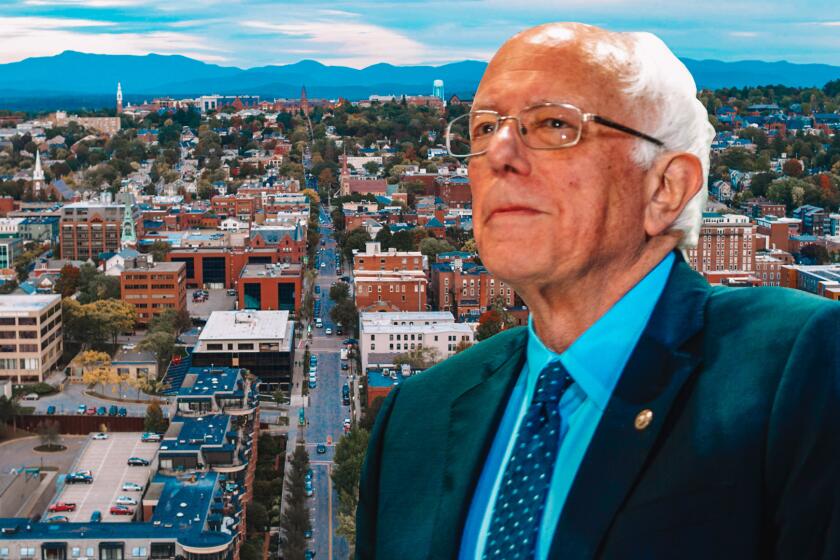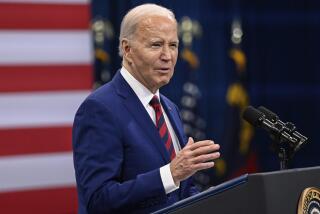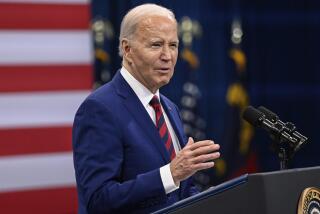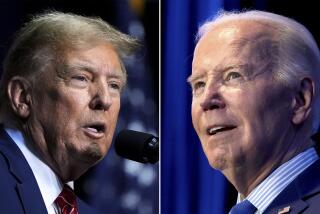Biden wins Michigan, Idaho, Mississippi and Missouri. Calls arise for Sanders to quit
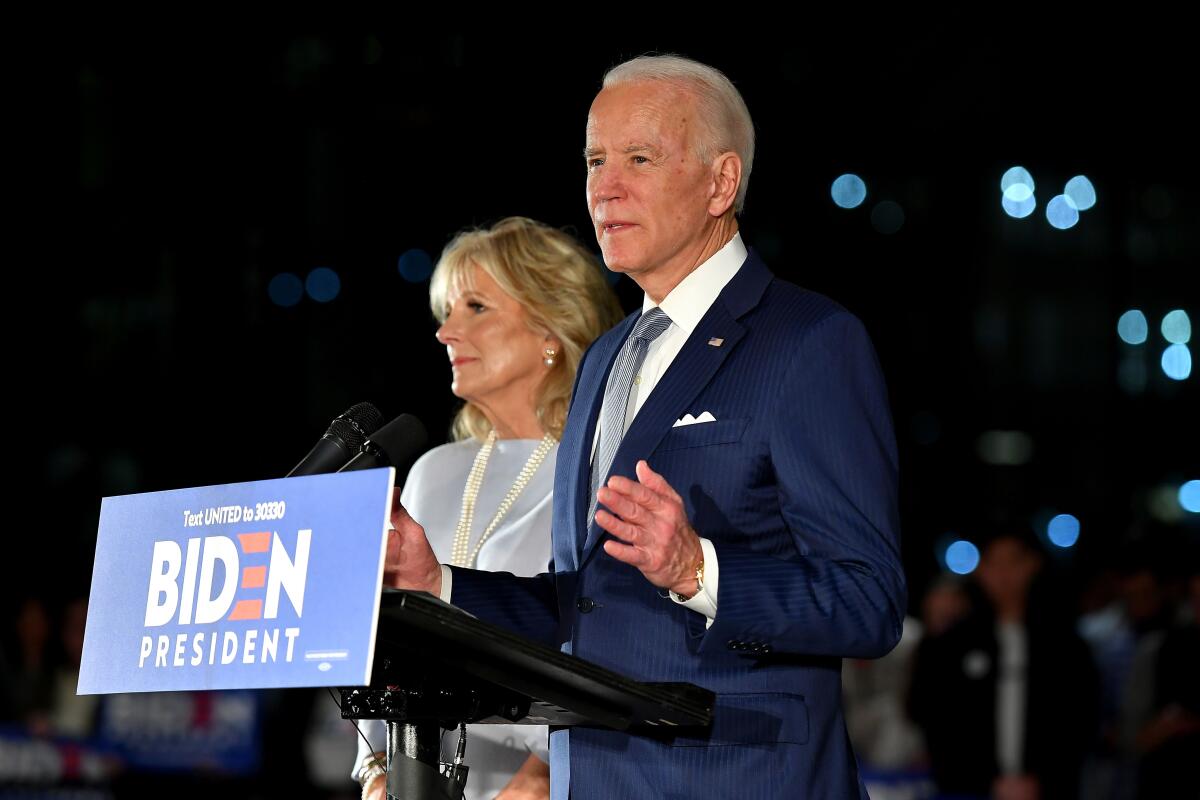
Joe Biden won the Michigan primary and three other states Tuesday, cementing his status atop the Democratic field and heightening calls for Bernie Sanders to stand aside and begin the process of unifying the party to face President Trump in November.
On a roll since taking command of the race in a remarkable turnabout last week, Biden also carried Missouri, Mississippi and Idaho, padding his delegate lead over the Vermont senator and lengthening the odds of Sanders mounting a similar comeback.
Sanders won North Dakota, his only victory. The two were essentially running even in Washington state, with about two-thirds of the vote tallied.
“The race for all intents and purposes was over last Tuesday. Michigan confirms it,” said Paul Maslin, a veteran Democratic strategist who is neutral in this year’s nominating fight. “The primaries in the rest of March will make it mathematically certain.”
Others, on different ends of the Democratic Party spectrum, echoed the sentiment as they threw their support to Biden.
Appearing in Philadelphia, the former vice president struck a solemn tone as he thanked Sanders and his backers for “their tireless energy and passion” and sounded several notes — a paean to the middle class, the promise of “a bold, progressive vision” — that seemed aimed at winning their support.
“We share a common goal and together we’ll defeat Donald Trump,” he said. “We’ll defeat him together.”
Sanders remained silent. In a break with election night tradition, his campaign announced there would be no public statement or appearance by the candidate after he flew home to Burlington, Vt., to await the results.
The balloting was modest compared with last week’s 15-contest Super Tuesday extravaganza. A mere 352 pledged delegates were at stake, compared with nearly 1,400 a week ago.
Still, the outcome in the six contests seemed likely to significantly shape the campaign going forward.
Joe Biden’s hometown of Wilmington is known for its small size and relationship-based politics. But just as in national politics, backlash has been brewing against the status quo.
The vote came as the two candidates were moving in opposite directions.
After facing near political death, Biden was on the ascent, showered with millions of dollars in contributions and bolstered by dozens of fresh endorsements after his 10 Super Tuesday victories. (He picked up another Tuesday night, from former rival Andrew Yang.)
Sanders was struggling to overcome Biden’s growing momentum as well as delegate math that makes his path to the White House increasingly steep.
Many in the party suggested it was time for the senator to face an increasingly bleak reality.
South Carolina Rep. James E. Clyburn, whose endorsement was instrumental in launching Biden to victory in his home state — a win that changed the course of the race overnight — said on NPR that it was time to “shut this primary down,” starting with the cancellation of a two-man debate scheduled for Sunday in Phoenix.
Guy Cecil, the head of Priorities USA, a major Democratic political action committee, said “the math is now clear” and announced the organization would throw its considerable weight behind Biden, beginning Wednesday with a TV spot in the November battleground state of Pennsylvania.
On the left, Ilya Sheyman, former head of the progressive political group MoveOn, sent “love and care” to Sanders and his campaign even as he signaled his belief the Democratic race was over. “We need unity in Nov. to stop Trump, win Senate & build future,” he wrote on Twitter.
Biden entered the day with 664 pledged delegates to Sanders’ 573, according to the Associated Press. It takes 1,991 delegates to win the nomination on the first ballot at the Democrats’ July convention, and Biden gained at least 150 delegates and Sanders 88, according to the AP.
Before the polls closed, Sanders and Biden announced they were canceling election night rallies scheduled in Cleveland ahead of next week’s Ohio primary, due to concerns about the spreading coronavirus. Biden spoke instead at the National Constitution Center in Philadelphia, where his campaign is headquartered.
Both camps said they would look to healthcare experts as they schedule events going forward.
The absence of large public gatherings — a trademark of Sanders’ two runs for president and an important organizing tool — could further dampen his hopes of surging back into contention, said Stuart Rothenberg, an independent campaign analyst. “Without those enthusiastic rallies, it’s hard to see how Bernie changes the trajectory of the Democratic contest,” Rothenberg said.
“The Democratic race is over,” he added. “The only question is whether Bernie Sanders knows it and admits it.”
Of Tuesday’s six contests, Michigan appeared to be the most important, offering the largest share of delegates — 125 — and carrying important symbolic weight.
Sanders won the state four years ago, a victory that sparked his insurgent campaign just as Hillary Clinton seemed about to wrap up the nomination, and his emphasis on working-class issues seemed especially well tailored to a large blue-collar electorate that has faced years of industrial decline and massive job losses to low-wage countries. He canceled appearances in three other states to spend more time in Michigan, a move that underscored its political import.
As he did in 2016, Sanders focused on trade, attacking Biden for his support of the North American Free Trade Agreement while serving in the Senate in the 1990s. Sanders raised the issue in two TV spots, one featuring an autoworker who said his community “has been decimated by trade deals” and lumping Biden together with President Trump.
Burlington shaped Sanders as Sanders shaped Burlington, so much so that it’s hard to consider one without the other.
But those attacks seemed to gain little purchase against Biden, who rolled out the endorsement of Gov. Gretchen Whitmer and other political luminaries. In a stark contrast with Clinton, he ran strongly among Michigan voters of all type: black and white, those with college degrees and without, city dwellers, suburbanites as well as rural residents.
Elsewhere, Mississippi and Missouri had both appeared promising for Biden from the start, given their respective political makeup and histories. (Clinton won both states four years ago.)
In Missouri, more than three-quarters of those who voted Tuesday said they were moderate or only “somewhat” liberal, words that could be used to describe Biden.
In Mississippi, the former vice president prevailed on the strength of overwhelming black support, repeating the pattern that carried him to victory Feb. 29 in South Carolina and helped him capture five more states across the South on Super Tuesday.
African Americans made up two-thirds of the Mississippi electorate, and nearly 9 in 10 voted for Biden. He also carried the black vote by sizable margins in Michigan and Missouri.
Repeating another pattern seen nationwide, the majority of voters in Michigan, Mississippi, Missouri and Washington said their top priority was choosing a candidate who could beat Trump in November, rather than one who agreed with them on issues. They voted in much greater number for Biden over Sanders, as they have in most other states, according to exit polls conducted by Edison Research.
The Vermont senator easily won North Dakota, Idaho and Washington in 2016. On Tuesday, the only place he came close to matching his performance four years ago was in North Dakota, which is a caucus state.
Idaho and Washington were caucus states then. This year they held primaries under a rules change supported by Sanders in hopes of boosting voter participation.
Times staff writer Melissa Gomez contributed to this report.
More to Read
Get the L.A. Times Politics newsletter
Deeply reported insights into legislation, politics and policy from Sacramento, Washington and beyond. In your inbox three times per week.
You may occasionally receive promotional content from the Los Angeles Times.


